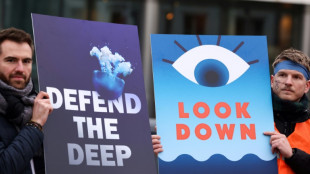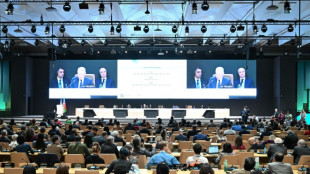
-
 China hosts Iranian, Russian diplomats for nuclear talks
China hosts Iranian, Russian diplomats for nuclear talks
-
Ireland eye unlikely Six Nations title against uncertain Italy

-
 Duterte's first ICC appearance set for Friday
Duterte's first ICC appearance set for Friday
-
From oil spills to new species: how tech reveals the ocean

-
 Curry bags record 4,000th three-pointer as Warriors rout Kings
Curry bags record 4,000th three-pointer as Warriors rout Kings
-
Hong Kong museum puts Picasso in cross-cultural dialogue

-
 Alcaraz three-peat bid on track as Cerundolo downed
Alcaraz three-peat bid on track as Cerundolo downed
-
Chinese, Iranian, Russian diplomats meet for nuclear talks

-
 England's Harry Brook banned from IPL for two years
England's Harry Brook banned from IPL for two years
-
Curry bags record 4,000th three-pointer as Warriors face Kings

-
 Former sex worker records Tokyo's red-light history
Former sex worker records Tokyo's red-light history
-
Australians welcome departure of baby wombat grabber

-
 Nepal community efforts revive red panda population
Nepal community efforts revive red panda population
-
Norris fastest in first Australian GP practice, Hamilton 12th

-
 Doncic drops 45 but Lakers pounded in Bucks loss
Doncic drops 45 but Lakers pounded in Bucks loss
-
Most Asian markets rise on hopes for bill to avert US shutdown

-
 ICC arrest, impeachment leave Duterte clan's political future in doubt
ICC arrest, impeachment leave Duterte clan's political future in doubt
-
China deports Japanese tourists over Great Wall buttocks pic: reports

-
 Swiatek to face Andreeva, Sabalenka meets Keys in Indian Wells semi-finals
Swiatek to face Andreeva, Sabalenka meets Keys in Indian Wells semi-finals
-
Messi scores off the bench as Miami progress in Jamaica

-
 War of words: Myanmar migrants face disinformation in Thailand
War of words: Myanmar migrants face disinformation in Thailand
-
France eye 'supreme objective' of Six Nations as Scotland visit

-
 Barca face Atletico rematch after defeat sparked unbeaten streak
Barca face Atletico rematch after defeat sparked unbeaten streak
-
Man City in Brighton test as Arsenal face Chelsea clash

-
 Marseille face up to gulf separating them from PSG in France
Marseille face up to gulf separating them from PSG in France
-
England's Six Nations ambitions on the line against Wales

-
 Take 'precautionary approach' on deep-sea mining: top official tells AFP
Take 'precautionary approach' on deep-sea mining: top official tells AFP
-
Renowned US health research hub Johns Hopkins to slash 2,000 jobs

-
 Russian teen Andreeva focused on the job as WTA ranking rises
Russian teen Andreeva focused on the job as WTA ranking rises
-
McIlroy tight-lipped about apologetic heckler incident

-
 Panama 'firm' on canal as US reportedly weighs options
Panama 'firm' on canal as US reportedly weighs options
-
Four-song EP by late singer Faithfull to be released in April

-
 You're kidding! Prince William reveals Aston Villa superstitions
You're kidding! Prince William reveals Aston Villa superstitions
-
Villegas, Spaun and Glover share Players lead, McIlroy one back

-
 Top US university says ending 2,000 positions due to Trump cuts
Top US university says ending 2,000 positions due to Trump cuts
-
Rangers down angry Mourinho's Fenerbahce to reach Europa League quarters

-
 Brazil top court to consider Bolsonaro 'coup' case on March 25
Brazil top court to consider Bolsonaro 'coup' case on March 25
-
Amorim 'proud' of Dorgu's honesty to overturn Man Utd penalty

-
 Medvedev outlasts Fils to reach Indian Wells semi-finals
Medvedev outlasts Fils to reach Indian Wells semi-finals
-
Fernandes sends Man Utd into Europa League quarters, Spurs advance

-
 Rangers down Mourinho's Fenerbahce to reach Europa League quarters
Rangers down Mourinho's Fenerbahce to reach Europa League quarters
-
Odobert double sends Spurs into Europa League quarter-finals

-
 Fernandes hat-trick fires Man Utd into Europa League quarters
Fernandes hat-trick fires Man Utd into Europa League quarters
-
Duterte's first ICC appearance set for Friday: court

-
 Stock markets tumble as Trump targets booze
Stock markets tumble as Trump targets booze
-
Home is where hurt is as Duplantis misses out on new world record

-
 Wales' Anscombe still eyeing 2027 World Cup despite Gatland doubts
Wales' Anscombe still eyeing 2027 World Cup despite Gatland doubts
-
Sea levels rise by 'unexpected' amount in 2024: NASA

-
 Trump tariff threat leaves sour taste for European drinks producers
Trump tariff threat leaves sour taste for European drinks producers
-
Defending champ Swiatek tops Zheng to reach Indian Wells semi-finals


Did cuts to shipping emissions spur more global warming?
Could a sudden drop in pollution from cargo vessels criss-crossing global shipping lanes be inadvertently making the world hotter?
The main reason for global warming is the heat-trapping emissions from burning fossil fuels.
But scientists have been looking at the extent to which a shift to cleaner, lower-sulphur shipping fuels in 2020 may have fuelled warming by reducing the amount of particles in the atmosphere that reflect heat back into space.
This theory surfaced again when January was declared the hottest on record, extending a streak of exceptional global temperatures that has persisted since mid-2023.
- Why did shipping emissions drop? -
On January 1, 2020, the sulphur content in engine fuel used to power container vessels, oil tankers and other ships in global trade was slashed by decree from 3.5 percent to 0.5 percent.
This was mandated by the International Maritime Organization (IMO), a UN agency that regulates the global shipping sector, including its environmental impact.
Sulphur oxides in fuels are tiny airborne particles harmful to human health and linked to strokes and the development of lung and cardiovascular diseases.
Some jurisdictions have even tighter restrictions in so-called "emissions control areas" in the Baltic Sea, the North Sea, the North American zone and the US marine Caribbean area.
- Is it working? -
The IMO estimated its fuel mandate would cut emissions of sulphur oxide by 8.5 million tonnes a year.
Last June, research published in the academic journal Earth System Science Data reported that sulphur oxide emissions from the shipping industry declined 7.4 million tonnes between 2019 and 2020.
The IMO said that in 2023 just two vessels flagged for inspection were found to be using fuel with a sulphur level above the 0.5 percent requirement.
Since the new regulation came into force, only 67 violations have been recorded.
- Is there a link to global warming? -
Sulphur oxides are not greenhouse gases like carbon dioxide or methane which are effective at trapping heat in the atmosphere, raising global temperatures.
On the contrary, they boost the reflectivity of clouds by making them more mirror-like and capable of bouncing incoming heat from the Sun back into space.
The sudden decline in these particles may have spurred recent warming "but we can't quantify it in an ultra-precise manner", said Olivier Boucher from the French National Centre for Scientific Research (CNRS)
He said studies had detected changes in clouds above major shipping lanes since 2020, including a greater presence of larger particles less reflective of sunlight.
Scientists could say shipping emissions had aided warming to some degree "but we are not able to say that it contributes a lot", Boucher added.
One study published in August in the journal Earth's Future concluded that the IMO regulation could increase global surface temperatures by nearly 0.05 degrees Celsius a year up until 2029.
The drastic reduction in airborne sulphur pollution helps to explain the exceptional heat of 2023 but the authors said the magnitude of the temperature extremes meant other factors were likely also at play.
H.Seidel--BTB

